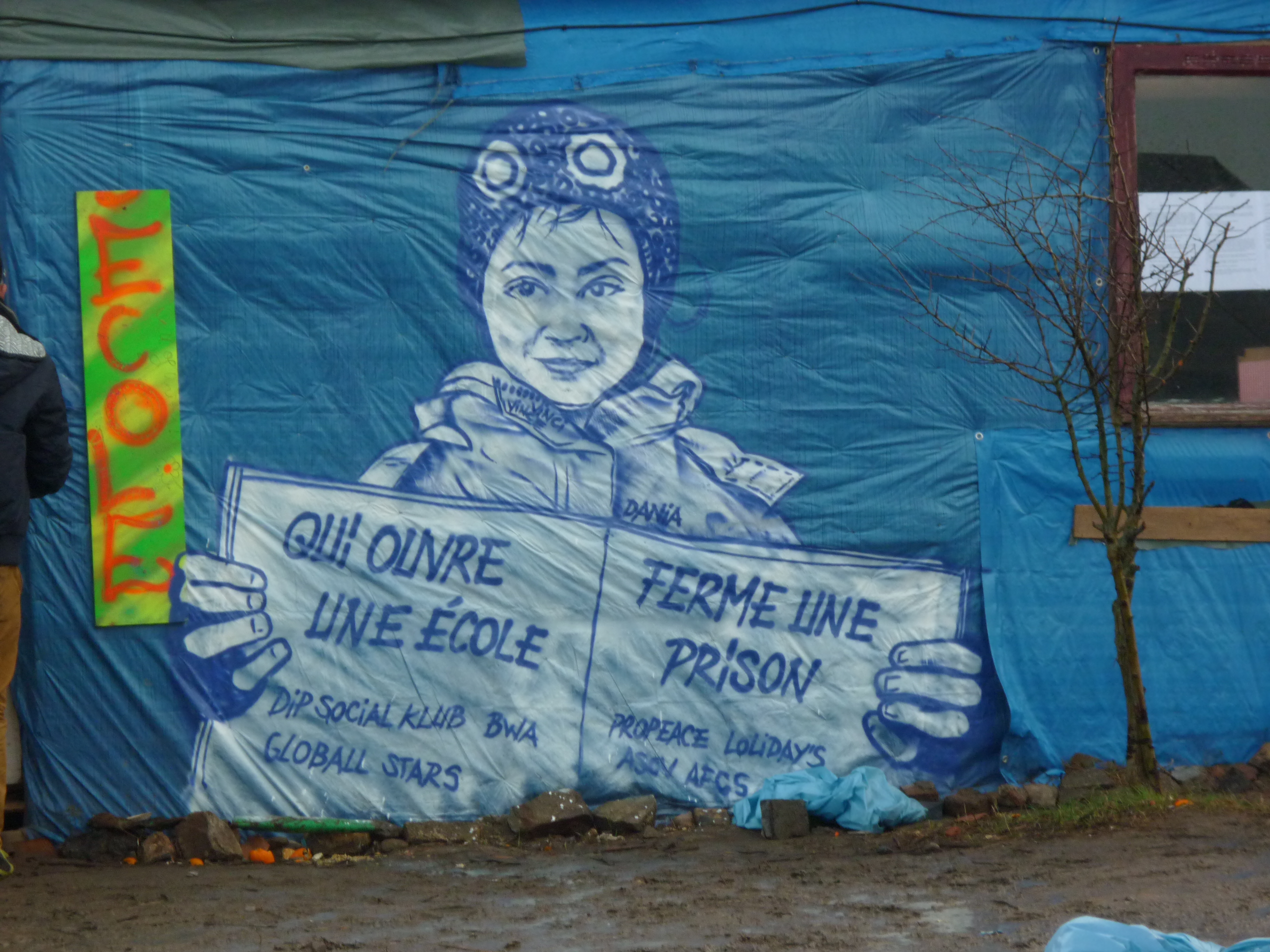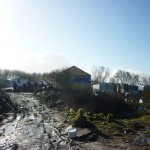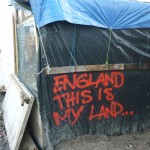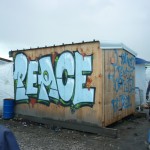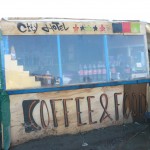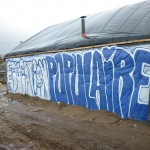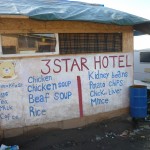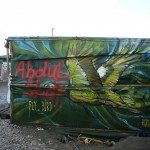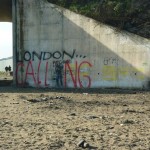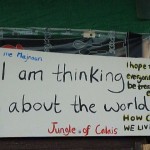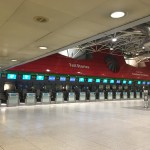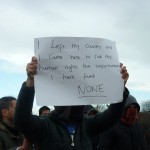If you’re a regular reader of this blog you’ll know that, following my 8th trip to The Jungle, the refugee camp near Calais in northern France, I was debating whether my trips there would continue in 2016. We’ve had lots of personal stuff going on this year already, not least a house move, and it’s kept me busy and not so involved in the humanitarian crisis. And to be honest – and this sounds completely selfish – I’ve enjoyed the time off. Going to Calais every two weeks for three months has been emotionally and physically draining and I felt like I was becoming obsessed with the situation over there and not focusing on my own life. Taking time out helped me refocus and I was starting to view Calais from a more detached viewpoint, as something I’d done my bit to help with, rather than something I was emotionally bonded to. But then the Swindon Calais Solidarity Group announced another trip, my son said we’d be going … And that was it, I found myself slap bang back into being involved – and even more so when we learned that our dear friend Ridwan would soon be leaving the Jungle and this would be our last chance to see him, and to say goodbye.
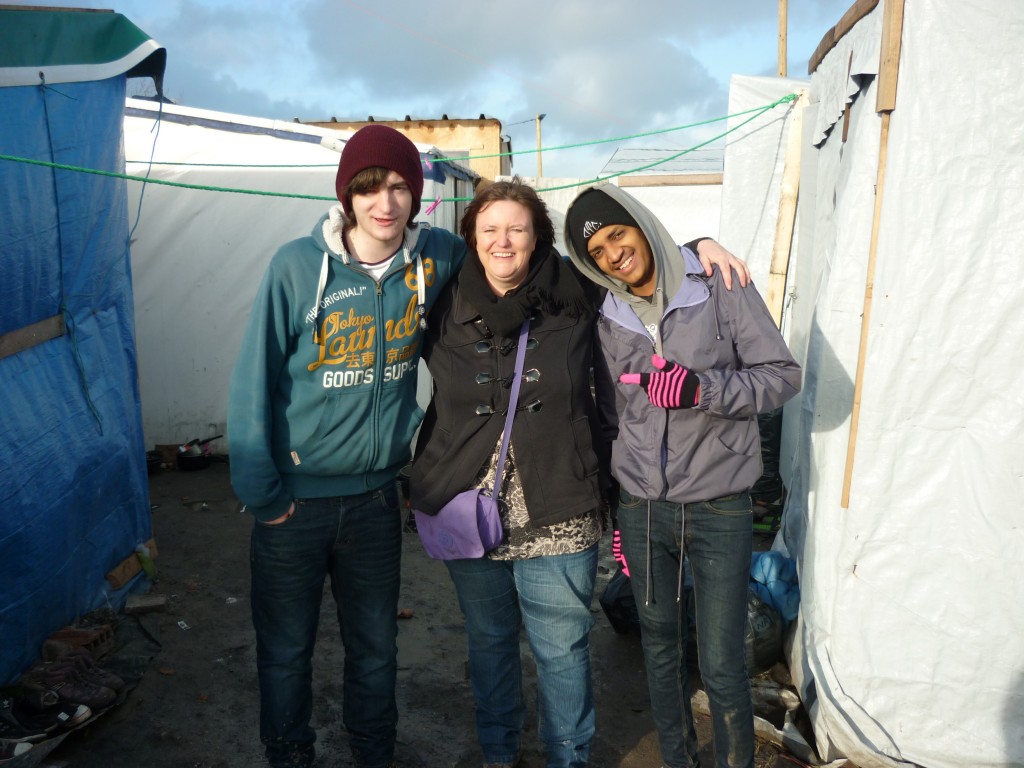 You may remember we met Ridwan on our very first trip, back at the end of September 2015. Just 14 years old, he had left Eritrea and travelled to Calais alone, leaving behind his parents, four younger brothers and a sister. We gave him a scarf, chatted about football – he’s a big Man United fan – and wished him well. The next time we went Ridwan found us – “Hey, do you remember me?” he asked – and spent much of the day with us, telling us a little about his life, proudly showing us his small, neat tent and pointing out the route he’d taken to get to the camp on the wall map in the Jungle Books library. We were won over by this beautiful boy’s charming smile, infectious laughter, sense of humour and positive spirit, and a friendship began. Since then we’ve sought out Ridwan every time. On our third trip we took him a bag of clothes after we learnt his possessions had been stolen; by then he had moved into a large tent with three other Eritrean guys. Next time they’d moved to one of the small shacks built by volunteers; over the following weeks we took them food, clothes, shoes, a wood stove. They made us tea and shared stories with us, talked about their lives back in Eritrea, their love for the country they’d left, their hopes for a brighter, more free future in the UK. People came and went – one of our friends made it over to the UK, others left for Germany, Sweden, Holland. We love all these guys, and the Eritrean girls who lived next door but Ridwan… Well, Ridwan is special. He became my son, my boy, and if there had been a way to bring him to the UK safely and legally, and bring him into my family, I would have done it. But of course there isn’t, and I’m generally a law-abiding soul with too much to lose by smuggling him in the back of the car … Though I can’t say I haven’t been tempted, many times.
You may remember we met Ridwan on our very first trip, back at the end of September 2015. Just 14 years old, he had left Eritrea and travelled to Calais alone, leaving behind his parents, four younger brothers and a sister. We gave him a scarf, chatted about football – he’s a big Man United fan – and wished him well. The next time we went Ridwan found us – “Hey, do you remember me?” he asked – and spent much of the day with us, telling us a little about his life, proudly showing us his small, neat tent and pointing out the route he’d taken to get to the camp on the wall map in the Jungle Books library. We were won over by this beautiful boy’s charming smile, infectious laughter, sense of humour and positive spirit, and a friendship began. Since then we’ve sought out Ridwan every time. On our third trip we took him a bag of clothes after we learnt his possessions had been stolen; by then he had moved into a large tent with three other Eritrean guys. Next time they’d moved to one of the small shacks built by volunteers; over the following weeks we took them food, clothes, shoes, a wood stove. They made us tea and shared stories with us, talked about their lives back in Eritrea, their love for the country they’d left, their hopes for a brighter, more free future in the UK. People came and went – one of our friends made it over to the UK, others left for Germany, Sweden, Holland. We love all these guys, and the Eritrean girls who lived next door but Ridwan… Well, Ridwan is special. He became my son, my boy, and if there had been a way to bring him to the UK safely and legally, and bring him into my family, I would have done it. But of course there isn’t, and I’m generally a law-abiding soul with too much to lose by smuggling him in the back of the car … Though I can’t say I haven’t been tempted, many times.
Ridwan and I have kept in touch via the Viber app and he called me last week to tell me he had given up any hope of reaching the UK and decided to go to Germany and claim asylum there. His friend had already left the camp and claimed in Holland, and I was already sad about not seeing him again – but the idea of losing Ridwan broke my heart. Which is why, despite having detached myself from Calais in many ways, I simply had to go yesterday to see my boy one last time and say goodbye.
And so we headed off to Calais yesterday with other members of the Swindon Calais group and two cars full of food parcels – sardines, noodles, tomatoes, onion, banana and chocolate – plus another bigger bag of food for Ridwan and his friends, a pair of walking boots – and a beginners German book! I was nervous about what we might find at the camp, because a couple of weeks ago the Calais prefecture ordered the demolition of a 100m strip of the camp – including the area where Ridwan lives, and the family area. Fortunately volunteers managed to move all the houses before the bulldozers moved in, but I was anxious about what the mood would be following such devastating and unnecessary action. There has also been intense police action in the last few weeks, including reports of volunteers being deliberately tear-gassed, and only the day before we’d heard that the police were demanding volunteers had official passes, asking for ID, fining people for minor car issues, turning people away. However, my anxiety was misplaced, for this time the camp was calm, the police mostly lurked in the shadows and the people were as welcoming as ever.
Before we drove to the camp we went to the L’auberge des Migrants warehouse to collect our passes and I was surprised to see mountains of food there – piles and piles of canned beans and vegetables, boxes of fresh onions and carrots, crates of milk and so on. It made me wonder why we had bothered bringing over our 170 individual food parcels, when there was seemingly so much food headed for the camp. Yet when we arrived, we met up with Ridwan and he and Dan (my son) handed out all our food parcels in no time. It could be that the food at the warehouse is all destined for the camp restaurants, which provide thousands of free meals every day. However, there are still big communities who want to cook for themselves, so perhaps the individual food parcels are still worth taking over. It’s something we need to think about for future trips.
While Dan was distributing food, I was being hosted by a trio of beautiful Eritrean girls in their late teens, who made me tea, applauded and giggled at my attempts to speak Tigrinya and gave me their personal shopping lists, which included leggings, eye liner and nail polish! Again, the idea of “personal shopping” is something our group is going to discuss for future trips – it’s these little luxuries that give people their dignity and humanity and some semblance of a normal life. However, it’s not clear how much longer we will actually be visiting the camp – more on that later.
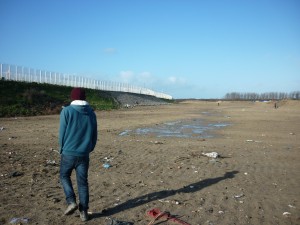 Ridwan then took us over to the recently demolished strip and we stood on the spot where his house used to be. It’s now situated near the Ethiopian-Eritrean church in the centre of the camp, and most of his friends are nearby, but you could see he was sad for the loss of the sharing caring community they had created in the area near the bridge. The strip extends 100m from the motorway bridge to the main “road” running through the camp and as far as the eye can see to the left and right. It’s shocking to see such a huge bare expanse of land where people were only recently living; it’s even more shocking to realise just how far the camp extended along the edge of the motorway.
Ridwan then took us over to the recently demolished strip and we stood on the spot where his house used to be. It’s now situated near the Ethiopian-Eritrean church in the centre of the camp, and most of his friends are nearby, but you could see he was sad for the loss of the sharing caring community they had created in the area near the bridge. The strip extends 100m from the motorway bridge to the main “road” running through the camp and as far as the eye can see to the left and right. It’s shocking to see such a huge bare expanse of land where people were only recently living; it’s even more shocking to realise just how far the camp extended along the edge of the motorway.
Next we walked back into the camp and along to the restaurant run by our friends Aziz and Afredo, where we ate chips and drank sweet milky Afghan tea. This has become a regular event for us, and it’s lovely to see our friends and support their business, especially as we first met them when the restaurant was just a wooden frame.
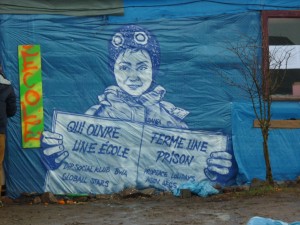 I also came across other buildings I’d not seen before, including the recently moved school, a youth centre and a legal advice centre. I asked Ridwan if he knew about any of these places and he said he didn’t; these are all in the centre of the camp and of course he lived in the bridge area for many months. A lot of the volunteer organisations seem to think all the camp residents are aware of the facilities available to them but this obviously isn’t the case. I wonder if knowing about the school etc would have made a difference to Ridwan’s life in the Jungle? Perhaps there’s a case for getting information out to people more consistently.
I also came across other buildings I’d not seen before, including the recently moved school, a youth centre and a legal advice centre. I asked Ridwan if he knew about any of these places and he said he didn’t; these are all in the centre of the camp and of course he lived in the bridge area for many months. A lot of the volunteer organisations seem to think all the camp residents are aware of the facilities available to them but this obviously isn’t the case. I wonder if knowing about the school etc would have made a difference to Ridwan’s life in the Jungle? Perhaps there’s a case for getting information out to people more consistently.
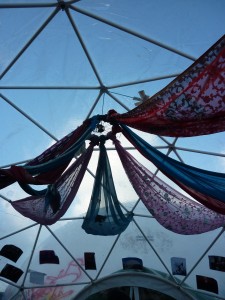 I was determined to visit the Dome, where community groups run art activities, and this time we made time to find it. It’s actually two domes – a small transparent outer dome which leads to a larger, enclosed space used as a theatre and music venue. We only stood in the outer area but for me, it was a place of peace and tranquility amid the chaos and hubbub of the camp. However, my two teenage companions were soon bored of the peace and quiet and dragged me back to Ridwan’s home, where we chatted, listened to music and danced.
I was determined to visit the Dome, where community groups run art activities, and this time we made time to find it. It’s actually two domes – a small transparent outer dome which leads to a larger, enclosed space used as a theatre and music venue. We only stood in the outer area but for me, it was a place of peace and tranquility amid the chaos and hubbub of the camp. However, my two teenage companions were soon bored of the peace and quiet and dragged me back to Ridwan’s home, where we chatted, listened to music and danced.
We’d taken some first- and second-time volunteers with us and they joined us in the hut when a heavy hailstorm beat down on the camp. It’s great to take new people to the Jungle so they can see it for themselves and take back their own experiences to share with those people who only see it though the eyes of the media. They told us they’d been blown away by the kindness of the refugees, and when Ridwan’s friend made tea and served it with biscuits, they were bowled over by the generosity of people who have so little to give, but who are so keen to share.
Our time in the camp was coming to a close and we walked back towards the car, with Ridwan in tow. He got a phone call from another friend who had attended the local hospital with an arm injury; he’d been discharged and was concerned about the walk back to camp, because the weather was very bad. We had tickets for the train and simply didn’t have the time to collect him, but I spotted a volunteer “taxi” minibus and asked if they could help, only to be told it was their last trip of the day and they couldn’t. I understand they have limits to what they can do, but it was frustrating not to be able to help.
I was dreading the moment when I had to say goodbye to my darling Ridwan. While I’m happy that he’s made the decision to leave the camp, which is no place for a young boy, and seek sanctuary in Germany, I’m also devastated that it bursts the dream I had of taking him into my home, as my son – even though in reality I know that was unlikely ever to happen. But finally the time came. Dan and I hugged him tight and we all shed a few tears. We wished him luck and I told him I loved him. “I love you too, Mami,” he replied. And then he turned and walked back towards his house, and I, inconsolable, returned to my car ready for the long drive home.
It’s the following morning now and just thinking about Ridwan makes me cry. Part of me wishes I’d never met him, never been to Calais, because then I wouldn’t feel so much pain. But we can’t live life like that, can we? We can’t not do things for fear of how it will affect us emotionally. All I can do now is stay in contact with my friend via the wonder of the Internet, and wish him all the best on his journey to Germany and his future there. He’ll be fine, I know he will. After all, he travelled from Eritrea to Ethiopia, through Sudan to Libya, across the Mediterranean to Italy and then up into France to Calais on his own. Getting the train to Paris and another to Germany will be a piece of cake! And I know he will have a much better life in Germany, where he can be fostered, fed, educated and do normal teenage boy things, than he has in the camp. But I can’t help feeling sad, almost grief for the loss of this wonderful boy who has touched my life in so many ways over the last few months. I truly hope that our bond helped make his life in the Jungle a little better, and a little easier to bear. And I also worry that the six weeks between my last two visits may have played a part in his decision to go to Germany; maybe he felt I’d deserted him. But then again, maybe I’m overthinking this, or overplaying my role in his life. I might just have been a nice lady who came to visit now and then and brought him chocolate. But I hope not; I hope it meant more to him than that. I hope we mean more to him than that.
So what does the future hold for our trips to Calais? I’ve realised that my last several trips have been focused almost entirely on supporting Ridwan rather than refugees generally; yes, I took food, scarves, other supplies over, but the main reason I went was to see my boy, and I’m not altogether sure that was a good thing. It’s reflected in these blog posts – initially they were full of lots of different people’s stories, and then they became more about what we’d done with Ridwan and his friends. So any future trips need to be focused more on the camp as a whole rather than specific people, and that should be easier once Ridwan has moved on, though I’ll always have a soft spot for his Eritrean friends. I’ve promised to do some shopping for the three girls we have befriended, and I know other members of our team have personal shopping lists they want to fulfil. But I think my focus now will be back on meeting people, hearing their stories – if they want to tell them – and giving support and love wherever it is needed, rather than bonding with individuals – and, of course, sharing my experience via this blog so other people can learn the truth about Calais, albeit the truth as I see it. Other members of our team had different stories from yesterday, including meeting a family who lost three children on their trip across the Med, and being rushed by the riot police during a peace demonstration. There are so many stories that need to be told, and I know I can tell them, so I probably will continue with the trips, but with a different objective in mind.
However, the biggest question is how long the camp will even be there for us to visit. The destruction of the 100m strip seems to have been only the start, as we heard the worrying news yesterday that the Calais prefecture is determined to remove the camp totally by the end of March. Although the number of people there has reduced significantly in the last few weeks, there are still around 5000 people there, including families, young women, teenage boys, disabled people, children and babies. Where are they supposed to go? It’s almost impossible for people to get across to the UK now and these people cannot return home. Germany and Sweden are limiting the number of refugees they accept, France seems generally hostile to immigrants and other countries are not so welcoming either. These are human beings we are talking about, people with hopes and dreams who deserve a decent, safe, free life. What will happen to the people if the camp is destroyed? It’s a very worrying situation.
